Property broker Tranio.com, in cooperation with the Spear’s Russia magazine, has completed a survey of forty-five private bankers to find out what countries Russian HNWIs immigrate to most often and why.
By Daria Berezina and Yulia Kozhevnikova, Tranio.com
According to a survey by the consulting company New World Wealth, Russia has the world’s sixth biggest outflow of individuals having a net worth over $1 million (high-net-worth individuals, HNWI).
In 2015, the number of Russian dollar millionaires shrank by 2 percent to 127,000 people. During the prior fourteen years (2000-2014) the outflow of Russian HNWIs ran at 20,000 people. Tranio.com, in cooperation with the Spear’s Russia magazine, has completed a survey among 45 private bankers to find out what countries the Russian HNWIs immigrate to most often and why.
Russian HNWIs: Who Are They?
According to a study by the Moscow School of Management Skolkovo Wealth Transformation Centre, the average high net worth individual in Russia is a married male entrepreneur of forty-eight years who started his business in the early 1990s. He has two to six children, and in five to seven years will already begin thinking of transferring the business to his heirs. Almost half (48 percent) of the respondents will leave their capital to their families.
Slightly less than half (43 percent) of the affluent Russian nationals run a business in the fields of finance, investment and insurance, and 27 percent are involved in commercial real estate development or management. More than half of the HNWIs (58 percent) do business in Europe. Most (71 percent) respondents invest in property alongside running their main businesses.
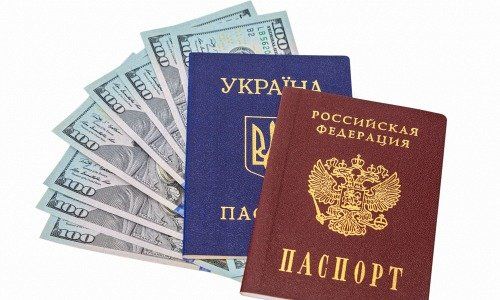
According to The Wealth Report study published by Knight Frank in 2016, the main problems plaguing the affluent individuals from Russia and the CIS are related to transferring the property by inheritance and legislation (80 percent of the respondents). The same problems will also remain current for a decade.
Push Factors: Political And Economic Instability
According to the survey by Tranio.com and Spear's Russia, the affluent of Russian citizens most often emigrate due to political and economic instability in their home country. A total of 58 percent of the respondents are of this opinion.
The following are the foremost culprits of the outflow of Russian HNWIs in 2014-2015: a tense atmosphere arising from the conflict in Ukraine, the subsequent sanctions and, ultimately, the weakening rouble. In addition, the respondents often named higher standards of living abroad as a reason for emigration (24 percent).
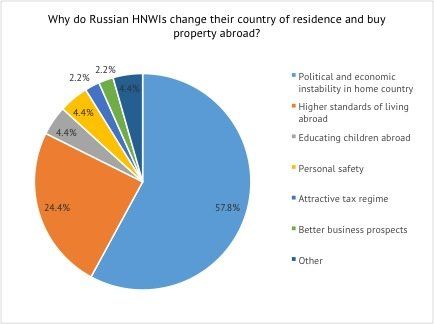
According to a survey by the Moscow School of Management Skolkovo, 56 percent of the respondents plan to keep living in Russia for a decade. Almost a fifth of them (19 percent) plan to emigrate to Europe, and 3 percent plan to go to the U.S..
As demonstrated by the Tranio.com and Spear’s survey, the most popular immigration destinations are the UK and Switzerland. They were mentioned by 73 percent and 44 percent of the respondents, respectively. Cyprus, Austria and Germany were also popular, each exceeding 20 percent.
Most Popular Destinations: The U.K. And Switzerland
The choice of country depends on the migrants' intentions. For instance, those who seek political and economic stability choose the U.K., Switzerland, Cyprus (where, in addition, getting a residence permit and citizenship is easy), Austria and Germany more often. Those for whom high living standards are especially important prefer the UK, Austria and Germany. Affluent nationals also emigrate from Russia to the UK in order to provide their children good education. They choose Spain for its favourable climate and high-quality healthcare system.
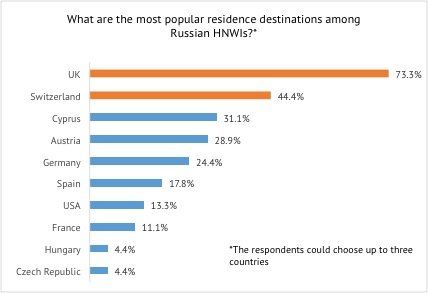
Looking forward 10 years, no changes among the top-ranked countries are expected, but demand for the US will grow thanks to a faster growing and more robust economy, as well as greater personal safety. The U.S. is equally popular for those who seek high standards of living, as well as for those who look for political and economic stability.
The U.K. will remain the №1 residence destination, though it will become less popular, primarily among those who emigrate mainly due to the uncertainty in their home country. This trend may be related to Brexit. In general, the residents most often preferred Germany, the U.S., Switzerland and Austria, the countries having the strongest and sturdiest economies, to the UK.
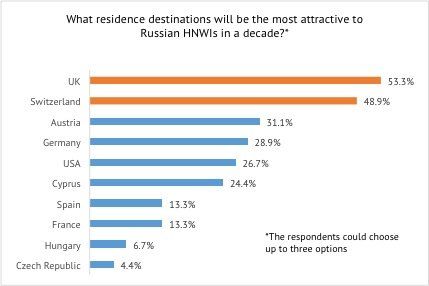
Will There Be An Outflow Of Russian HNWIs?
More than a third (35 percent) of the respondents think that the outflow of Russian HNWIs will increase, and the same percentage believe that the number will remain stable. At the same time, most of those who expect the outflow to grow believe that the volume will be insignificant.
Therefore, the majority of the respondents do not expect any notable changes in the number of HNWIs. As the Russian economy has started recovering, the number of those wishing to emigrate due to the economic instability in their home country is unlikely to continue rising dramatically.
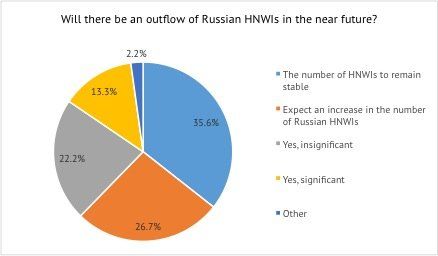
(Source for all graphics: Tranio.com and Spear's Russia)



















